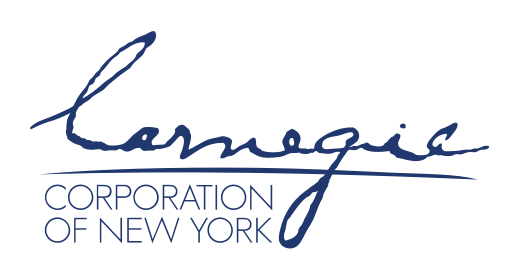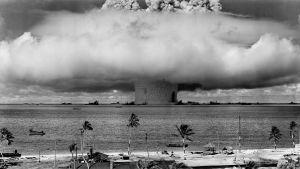While crediting the US nuclear arsenal for its deterrent effect, Americans are less clear on its impact on the country or their personal safety.
Several survey research organizations have investigated American public tolerance toward the US use of nuclear weapons and the sense of threat from nuclear proliferation but fewer have focused on how much Americans actually know—and whether they want to learn more—about nuclear weapons. To help fill that void, the Chicago Council on Global Affairs and Carnegie Corporation of New York teamed up to conduct a benchmark study that gauges American awareness and interest in learning more about US nuclear policy, public confidence in nuclear deterrence, and trusted public sources of information about US nuclear policy.
Key Findings
- A narrow slice of the US public say they are at least somewhat familiar with the effects of nuclear weapons (53%), US nuclear weapons policy (30%), the targets of US nuclear weapons (31%), and the cost of these weapons (20%).
- Six in 10 Americans say they are at least somewhat interested in learning more about US nuclear weapon policy, especially basic information about how nuclear weapons work and their effects.
- By a 5 to 1 ratio, more Americans say that the US nuclear weapons arsenal makes the country safer (47%) than less safe (9%). But many also say the US arsenal does not make a difference in the country’s safety, and 19 percent say they do not know enough to say one way or the other. Additionally, a majority say they do not know enough to assess the benefit or harm of nuclear weapons to them personally (58%).
- Two-thirds believe that US nuclear weapons have been effective at preventing conflict between the United States and other countries (63%). Washington’s ability to retaliate with nuclear weapons (46%) is named more than any other factor for the primary reason that the United States has managed to avoid a nuclear attack.
- Those who report being familiar with US nuclear policy are more likely to believe nuclear weapons make the country safer (56%, vs 43% of those less familiar with nuclear policy). They are also more likely to view US nuclear weapons as having been effective in preventing conflict between the United States and other countries (71%, vs. 59% of those less familiar).
Some Familiarity with Nuclear Policy, Weapons, and Deterrence
The US nuclear weapon arsenal has a unique role in underpinning international security and is a central pillar to the US alliance system abroad. But current geopolitical instability, including Russia’s invasion of Ukraine, have raised important questions around the effectiveness of the US nuclear umbrella in deterring aggression. In the United States itself, new debates have emerged around the value of nuclear weapons, the infrastructure needed to maintain them, and the importance of arms control regimes. While most of these conversations occur within expert circles, what do everyday Americans know and think about US nuclear policy?
The joint Chicago Council on Global Affairs and Carnegie Corporation of New York survey of the American public provides some background. A narrow portion of the US public say they are at least somewhat familiar with US nuclear weapons policy (30%), the cost of nuclear weapons for the United States (20%), the effects of nuclear weapons (43%), who the US targets with nuclear weapons (31%), and the US missile defense system (31%). In a separate question, 40 percent say they are at least somewhat familiar with the concept of nuclear deterrence. These indicators of awareness—while useful for analysis—are not to be taken literally. The survey did not test true knowledge about nuclear weapons or nuclear policy; therefore these responses are somewhat subjective, depending on the self-confidence of individual respondents in their own familiarity with these topics.
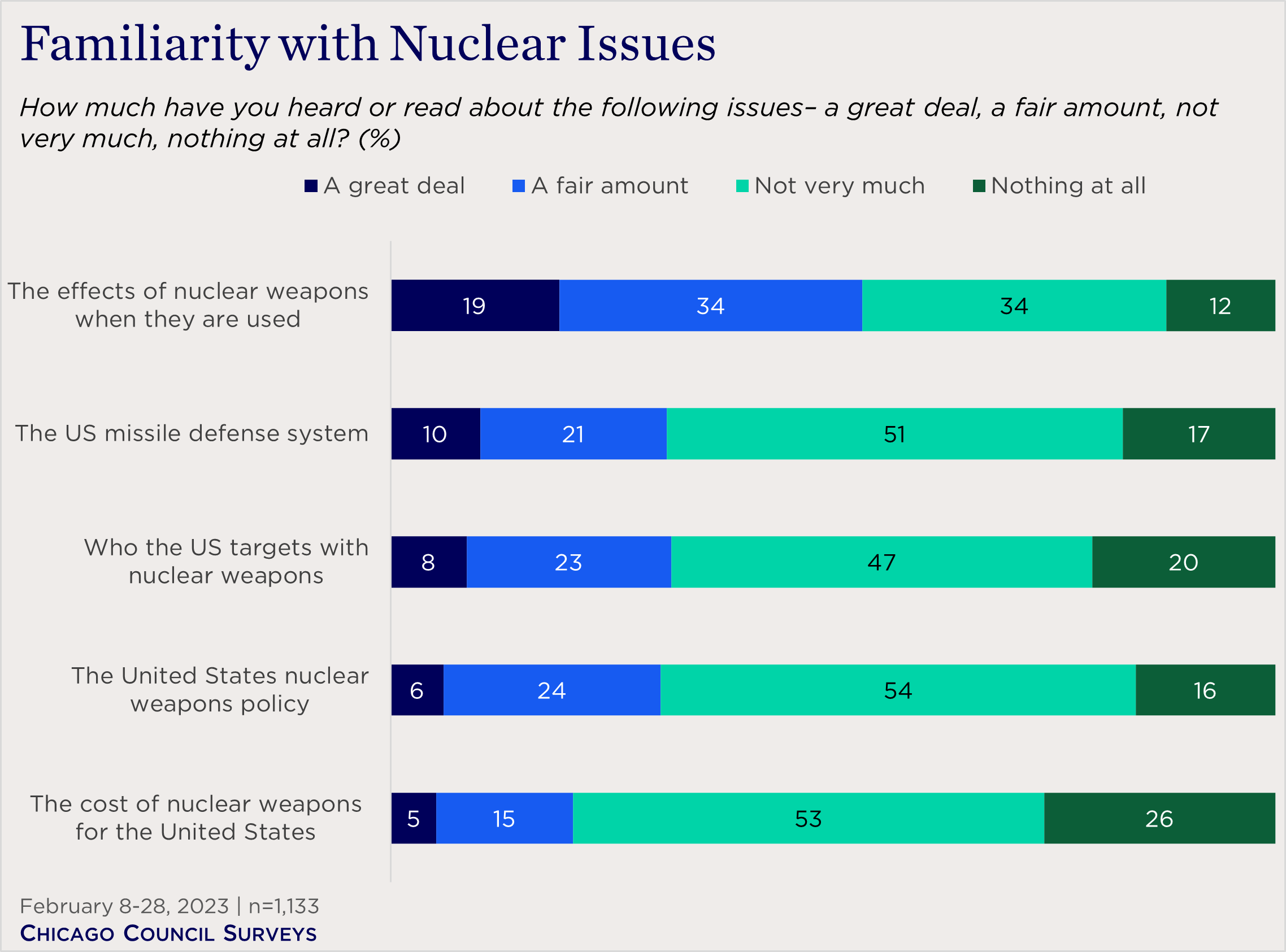
Public Credits Deterrent Effect of Nuclear Policy and Missile Defense
A majority of Americans believe that US nuclear weapons have been very (24%) or somewhat (39%) effective at preventing conflict between the United States and other countries. In turn, more attribute the US ability to retaliate with nuclear weapons (46%) than other factors for the primary reason that the United States has managed to avoid a nuclear attack since these weapons were invented.
For the most part, there are not many significant differences across racial and ethnic groups in the US public on these questions, although a larger proportion of Hispanic and Black Americans say they do not know enough to give a firm response to some of these questions. When asked about nuclear weapons being effective for preventing conflict, a larger majority of White Americans (68%) than Black (45%) and Hispanic Americans (52%) think they are effective, with about a third of Blacks and Hispanics saying they don’t know enough to say.
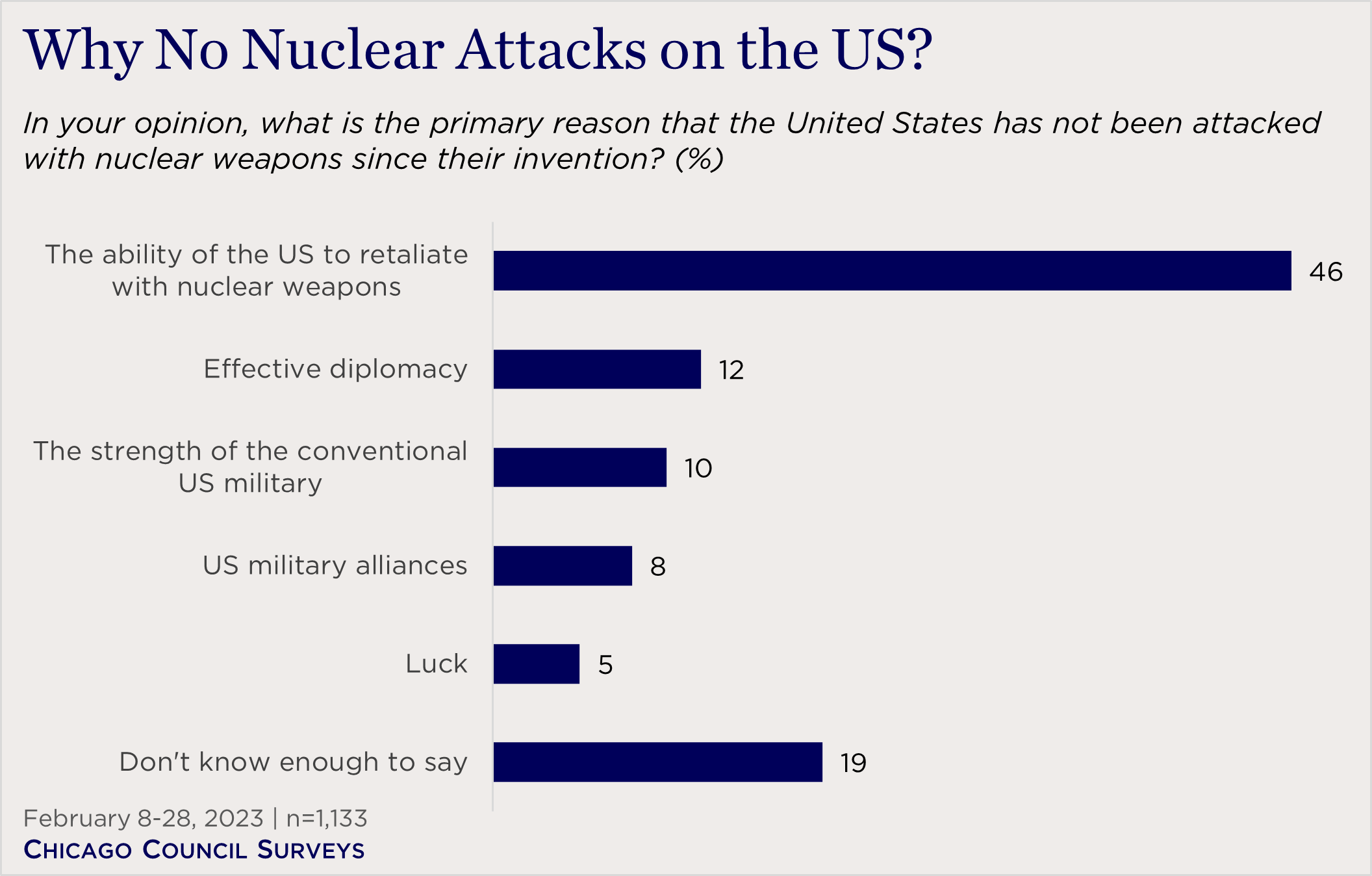
Those who say they are familiar with the concept of nuclear deterrence consider it effective. Nine in 10 (88%) of those familiar with the concept say it has been very (46%) or somewhat (42%) effective over the past 70 years or so, and they are more likely to say that the US ability to retaliate with nuclear weapons is the reason why the country has not been attacked with nuclear weapons (64%, vs. 35% of those reporting less familiarity with deterrence). When those who are unfamiliar with the concept were prompted with an explanation, a smaller majority (56%) thought it had been effective over the past 70 years.1
Perhaps for this reason, relatively few Americans think it is likely that Russia would use a nuclear weapon against the United States in response to US support for Ukraine (24% somewhat, 4% very likely). A majority (55%) think this is unlikely, and 14 percent say they do not know enough to say.
Additionally, while not quite a majority, 46 percent of Americans say they are at least somewhat confident in the US missile defense system ability to protect them and their families in the event of a nuclear war (39% lack confidence and 14% don’t know enough to say). Those Americans who have heard at least a fair amount about the US missile defense system are more likely to have confidence in it (56%, vs. 42% among those who have heard not much or nothing at all about it).
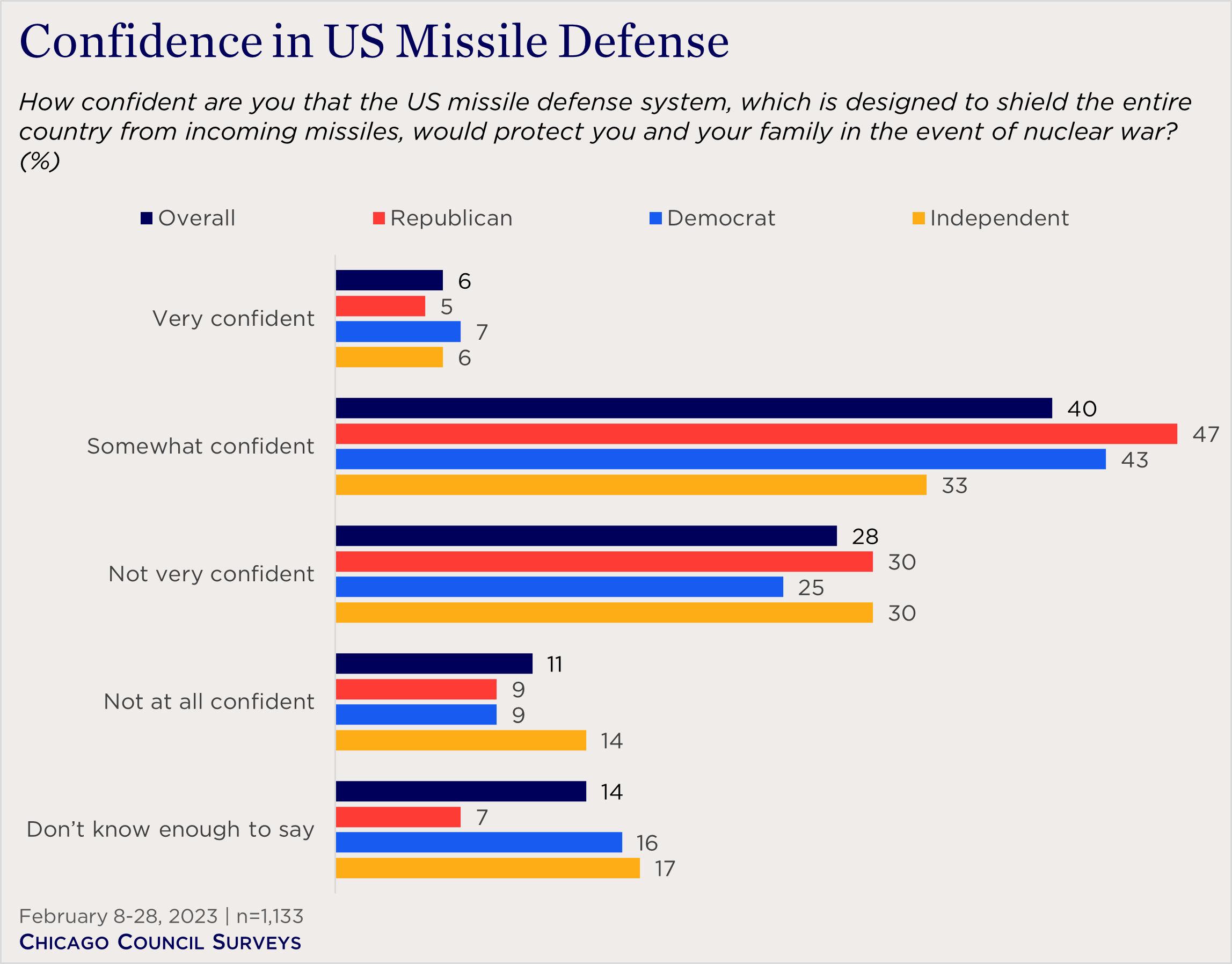
Majority Uncertain Whether Nuclear Weapons Bring More Benefit or Harm
While crediting US nuclear policy for its deterrent effect, Americans are less clear on its impact on the country or their personal safety. About four in ten Americans either believe that US nuclear weapons do not make a difference to national safety (24%) or say that they don’t know enough to judge whether they do or not (19%). Among the rest, almost half of Americans say that the United States having nuclear weapons makes the country safer (47%) compared to 9 percent who say it makes the country less safe.
Republicans are particularly more convinced that they make the United States safer (61% vs. 45% Democrat). White Americans are also more convinced US nuclear weapons make the country safer than other racial and ethnic groups, mainly because the other groups are more inclined to respond that they don’t know enough to say. Age also plays a role in views of nuclear weapons and national safety. A majority of Americans over the age of 45 (55%) say that the US nuclear arsenal makes the country safer, while only a plurality of those 44 and younger say the same (38%). Younger Americans are more likely to say that it doesn’t make a difference (28%, vs. 20% of older Americans), or that it makes the country less safe (13%, vs. 6%).
Meanwhile, a majority of the public is unsure they can assess the benefits or harm of nuclear weapons. More say they do not know enough about nuclear weapons to assess the benefit or harm to them personally (58%) than say they do (41%).
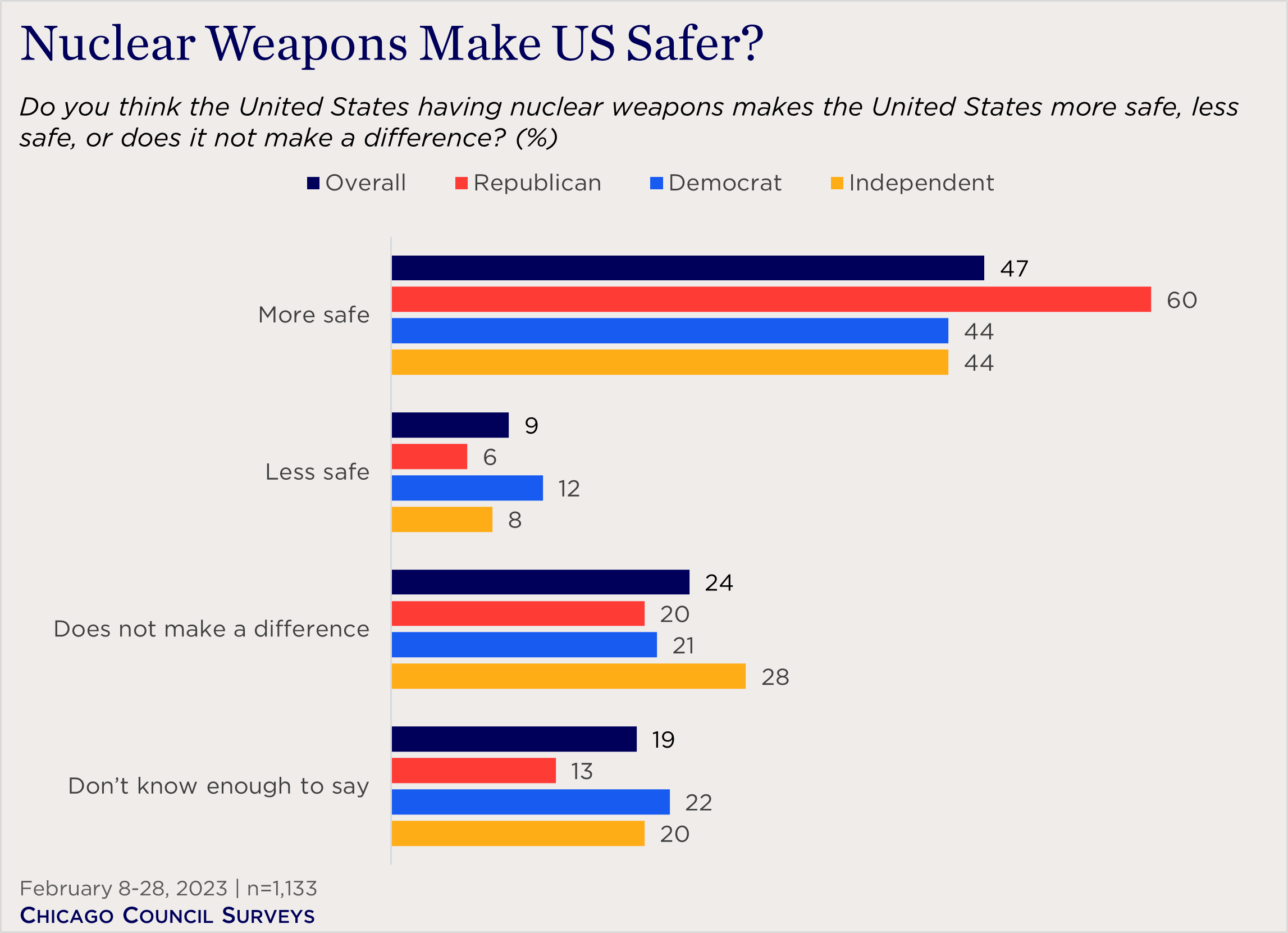
Those who claim familiarity with US nuclear policy are more likely to believe nuclear weapons make the country safer (56%, vs 43% of those less familiar with nuclear policy. But a quarter each among both those familiar and unfamiliar with nuclear policy say nuclear weapons do not make a difference either way. Those familiar with US nuclear policy are also more likely to view US nuclear weapons as having been effective in preventing conflict between the United States and other countries (71%, vs. 59% of those less familiar).
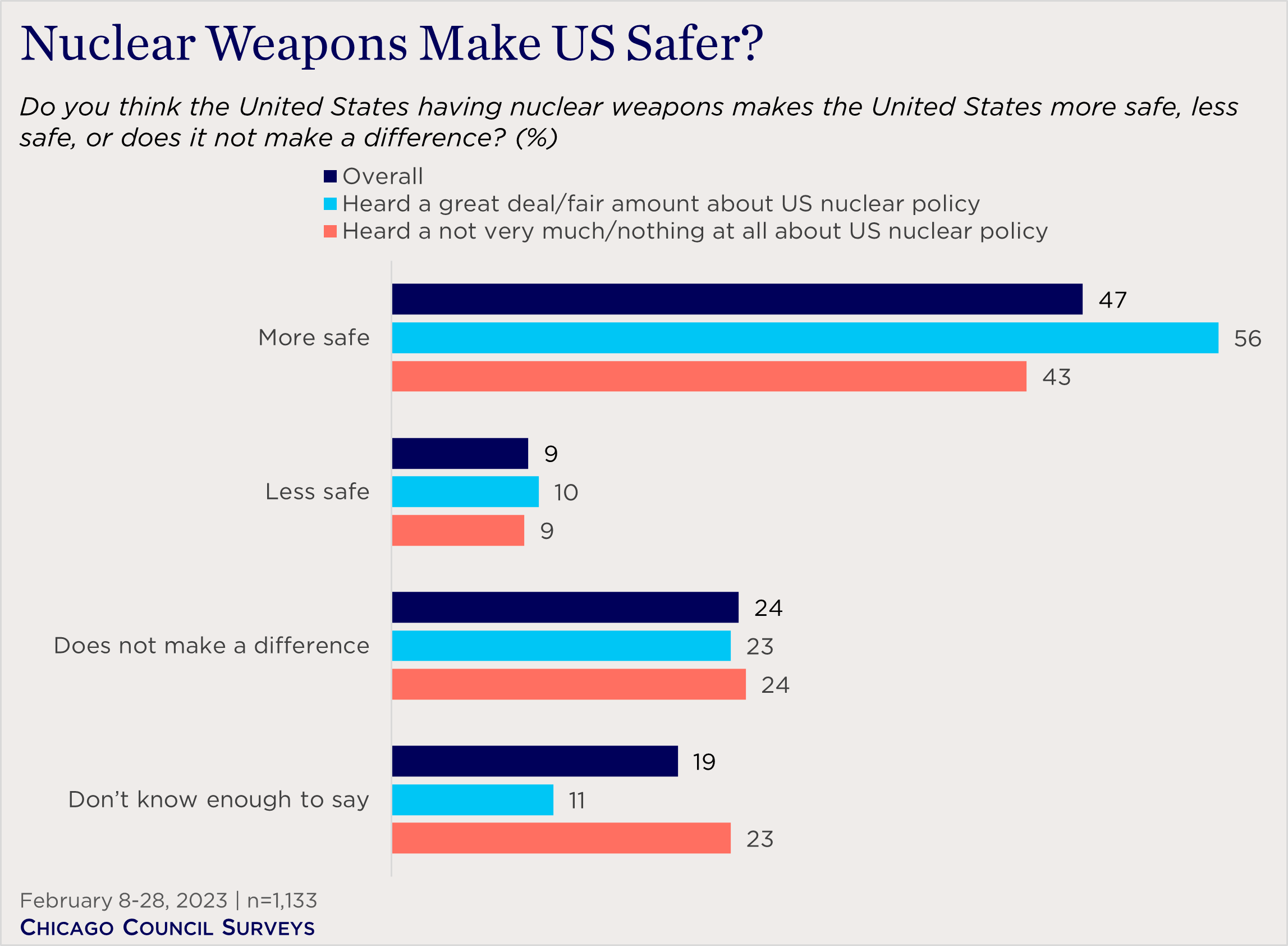
Majority Say They Would Like to Learn More about Nuclear Weapons Policy
While Americans have limited familiarity with nuclear policy, there is an interest in learning more. Six in 10 Americans say they are at least somewhat interested in learning more about US nuclear weapon policy (15% very, 45% somewhat). When those who are interested in learning more were asked in an open-ended question what specifically they would like to know more about, most responses fell into three broad categories: basic questions about how nuclear weapons operate (24%), the effects of nuclear weapons when they are deployed (22%), and more details about US nuclear weapons policy (18%).
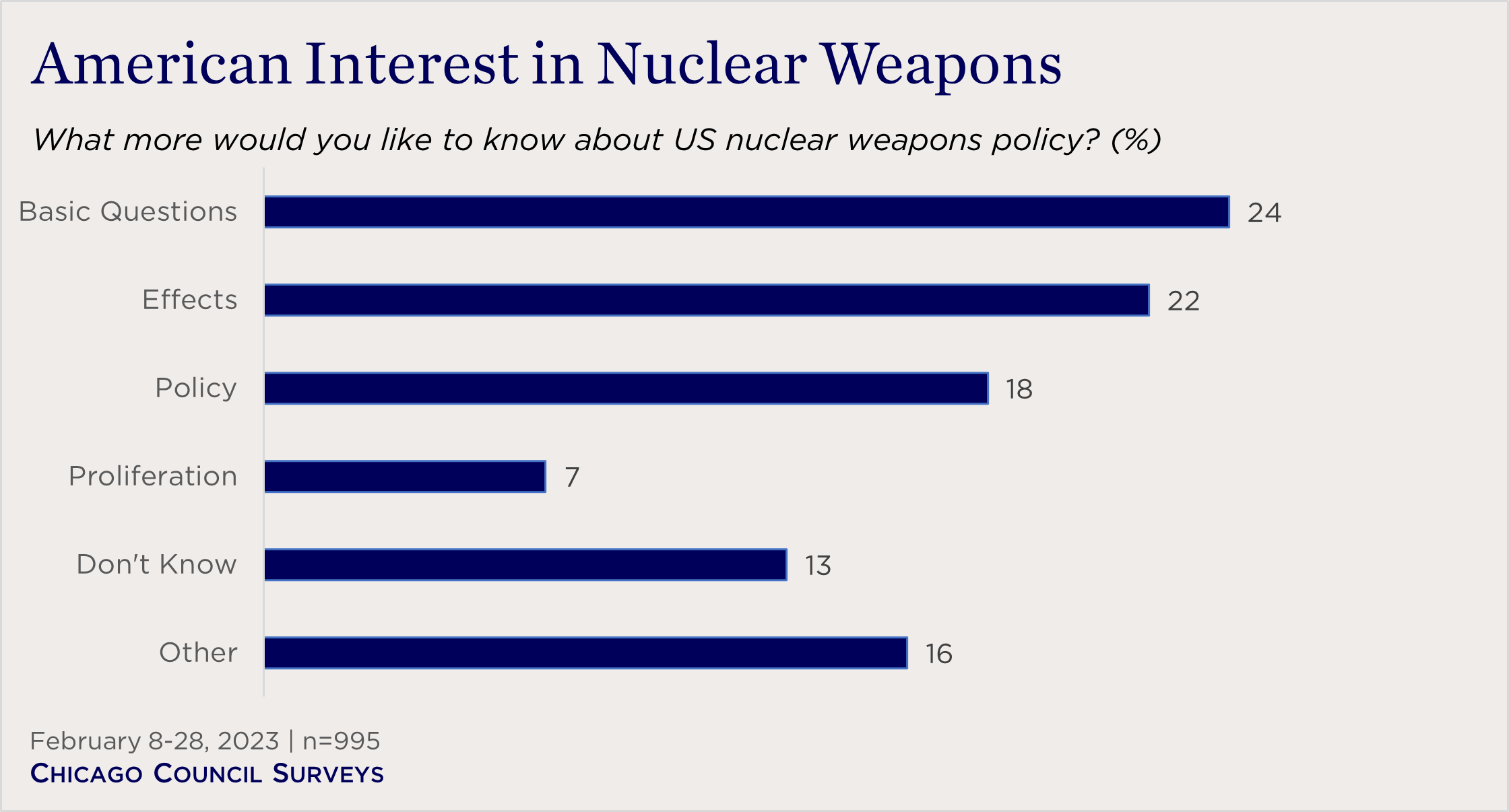
For the first category, people wrote in comments that touched upon the science of how nuclear weapons work, what the US arsenal includes, and where they might find out more information about US nuclear weapons. Those who would like to know about the effects of nuclear weapons asked about their impact on people, society, and the US economy, as well as how to prepare against a potential attack. The third set of responses touched on policy, including questions about who the United States targets with their nuclear weapons, under what circumstances, the decision-making process, how the United States intercepts other countries’ attacks, and whether Americans are safe. In addition to these three buckets, 7 percent of those responding to this question wanted to know about proliferation issues such as who else has nuclear weapons, whether that is a problem, and how to prevent more countries from obtaining them.
Academics and US Military Leaders Trusted Most for Information
Majorities of Americans say they have a great deal or a fair amount of trust in the information they receive from academics (58%) and US military leaders (56%) about nuclear weapons. Fewer trust information coming from the president (43%; 62% among Democrats, 24% Republicans), the US news media (43%), Congress (37%), activist groups (22%), and social media (15%).
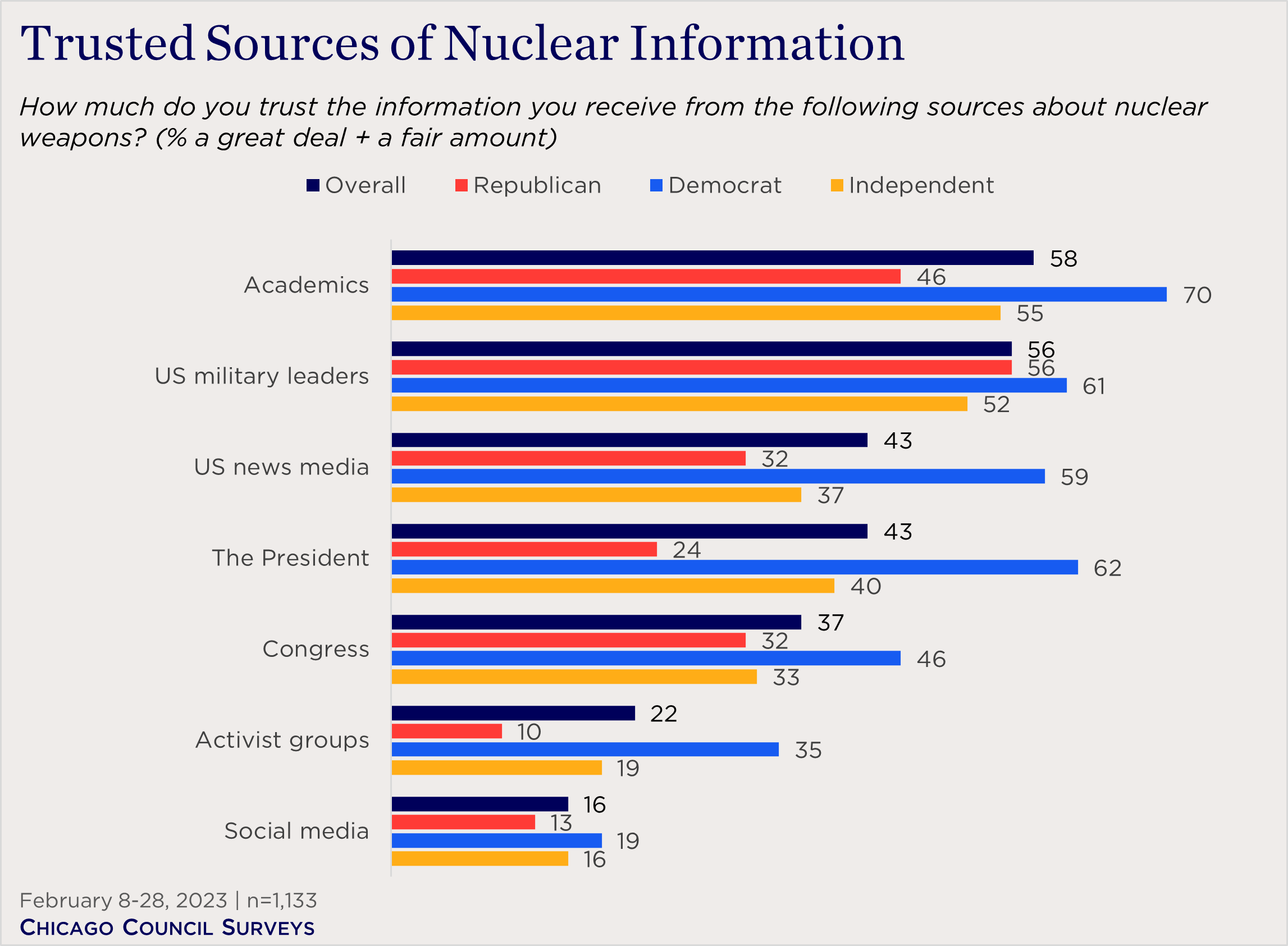
In general, Democrats are more likely to trust information coming from these sources than are Republicans. The exceptions are US military leaders, a trusted source for both party supporters, and social media, which neither constituency trusts.
Some of these responses seem to reflect partisan leanings, however. When asked how much influence various groups and individuals should have on US nuclear weapons policy, US military leaders (77%) along with the president (71%) and Congress (69%) are among the top choices. Six in 10 also say the American people should be more influential (62%). Though academics top the list for Americans as a trustworthy source of information, just under half (48%) say they should have a great deal or a fair amount of influence on US nuclear weapons policy. No more than a quarter think that activist groups (24%) and the news media (21%) should be more influential on nuclear policy.
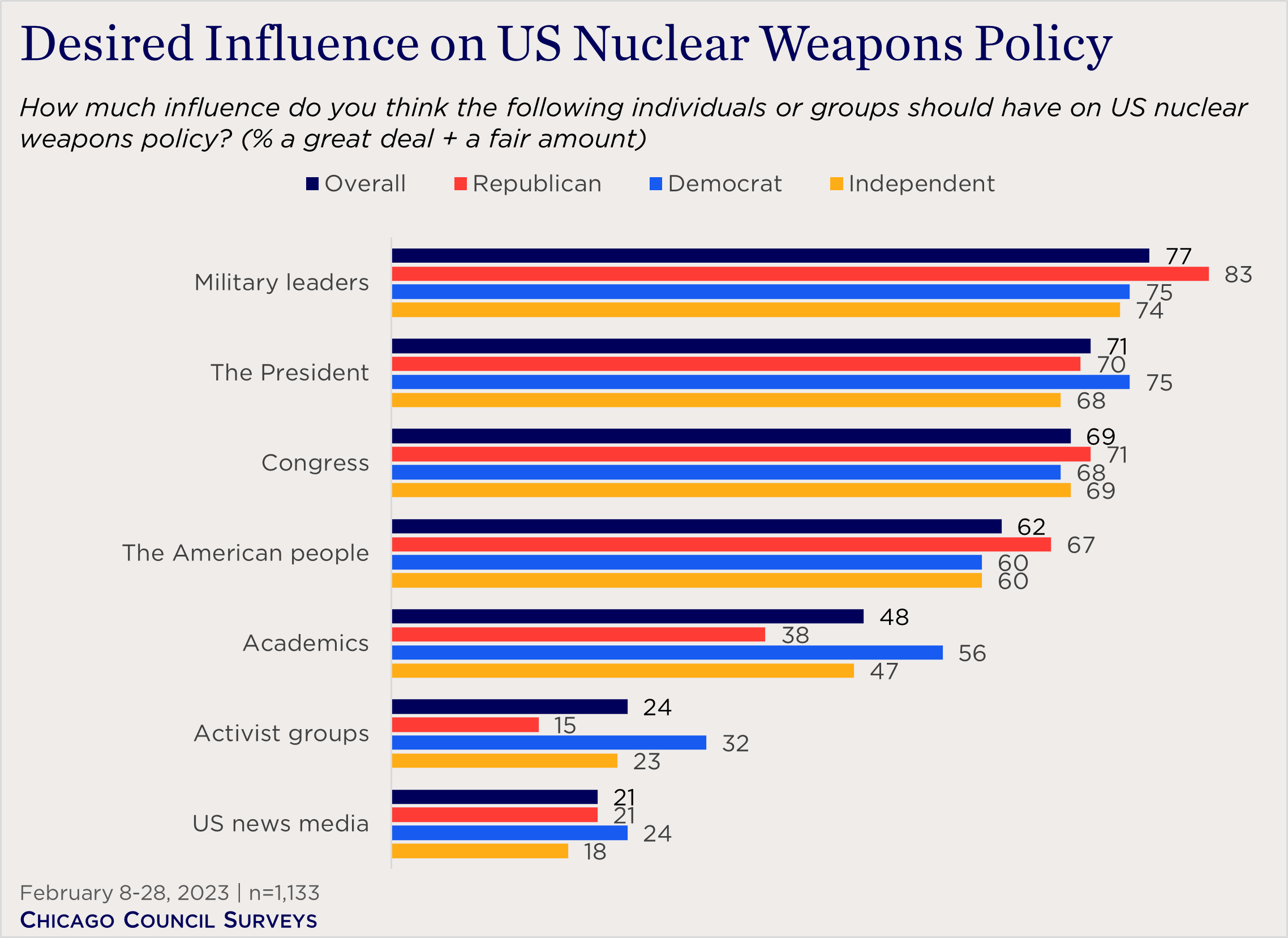
Partisanship has more of a bearing on questions about the sources Americans trust than about their preferences for who should have more influence on US nuclear policy. Though Republicans are notably less trusting of information received from the president (just 24% have a great deal or a fair amount of confidence), seven in 10 (70%) nevertheless want the president to have influence on US nuclear weapons policy. This suggests that a different president, especially one from their own party, might be trusted to a greater extent.
At the same time, although the public wants the president to be influential in making US nuclear policy, Americans aren’t really that comfortable with the president having the sole authority to authorize the use of nuclear weapons by the United States. Six in 10 (61%) say they’re uncomfortable with sole authority, while four in 10 (38%) say they’re comfortable with the policy. Here, partisanship again plays a role: three-quarters of Republicans (73%) say they are uncomfortable with sole authority, while Democrats are divided on the issue (52% comfortable, 48% uncomfortable).
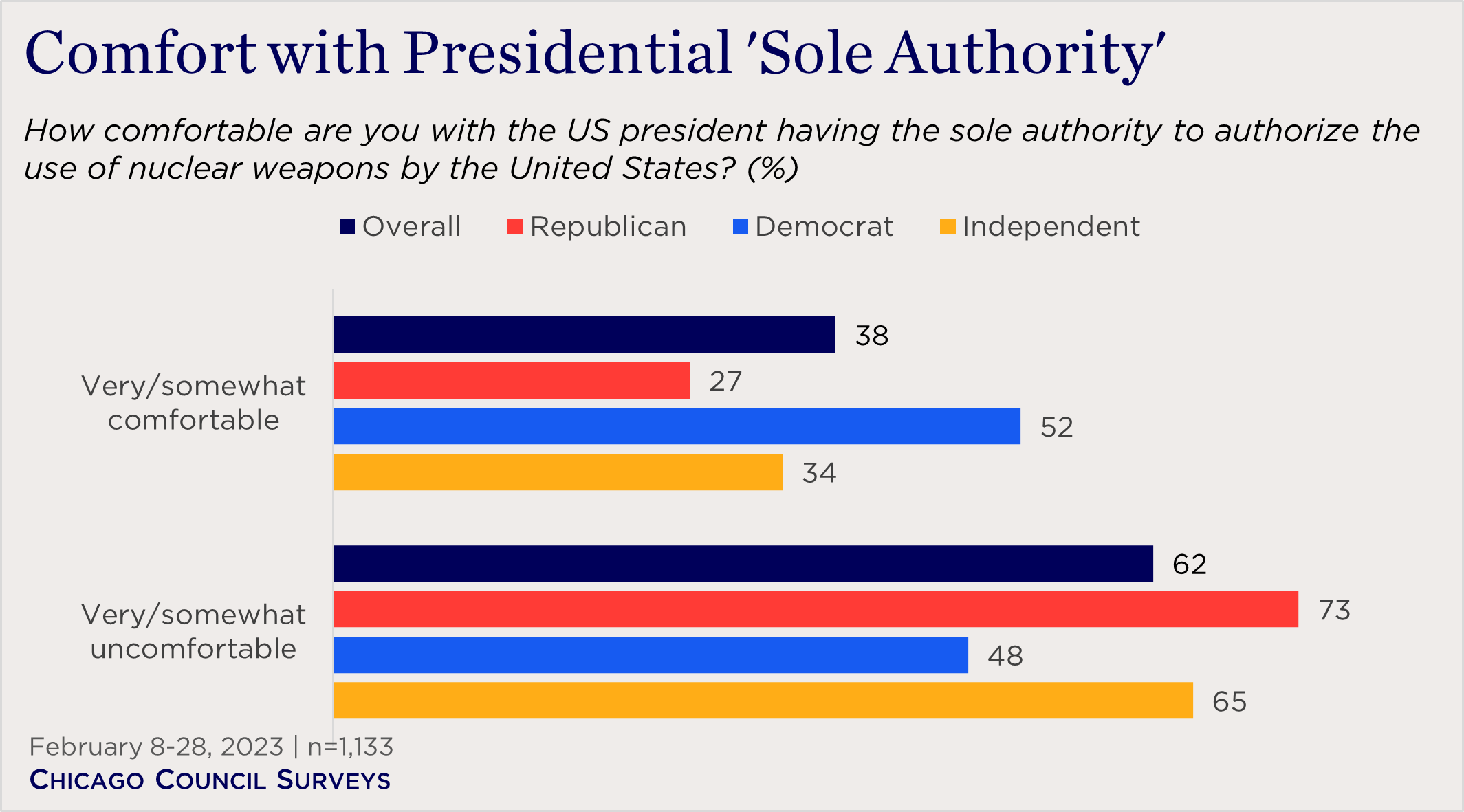
A Healthy Appetite for National Security News
While no more than a quarter of Americans think media organizations should have much influence over nuclear policy, they still turn to particular media sources to stay informed on national security. A majority of Americans are at least somewhat interested in news about US national security (81%), including four in 10 (42%) who are very interested. Republicans are the most likely to report being very interested in news about US national security (49%), while Democrats tend to report comparatively greater interest in national news (41%) and news about US foreign relations (40%) or the war in Ukraine (39%).
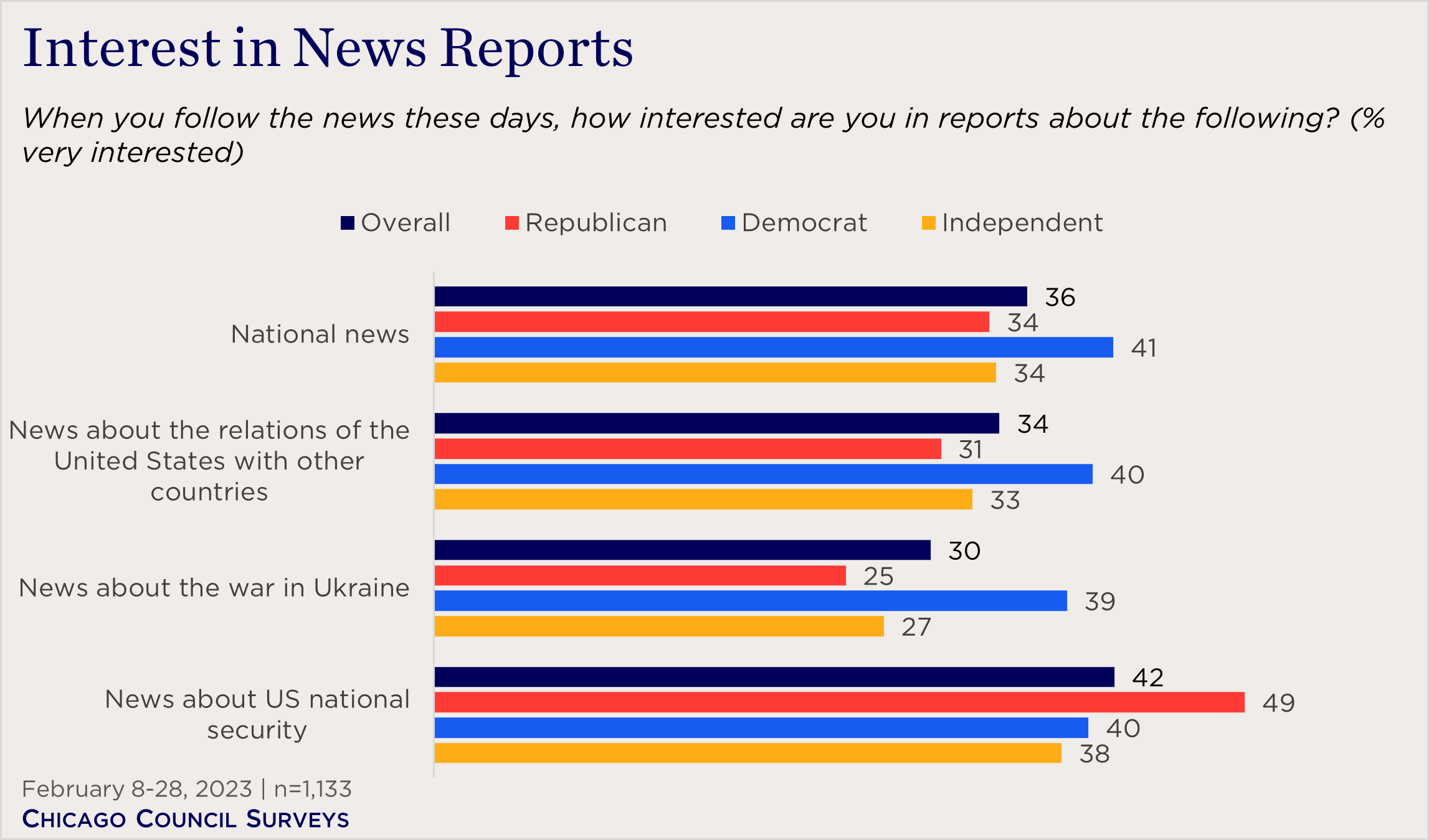
The most popular source of news for Americans is network TV news, such as ABC, CBS, or NBC. Three in 10 Americans (30%) say this is the source they turn to most often for news about the United States and the world, including pluralities of Republicans and Democrats. The second most popular source of news is social media, which is particularly popular among Independents (27%). Cable news sources tend to be popular with only one partisan group (CNN for Democrats, Fox News for Republicans), while blogs, radio, newspapers, attract smaller shares of public attention.
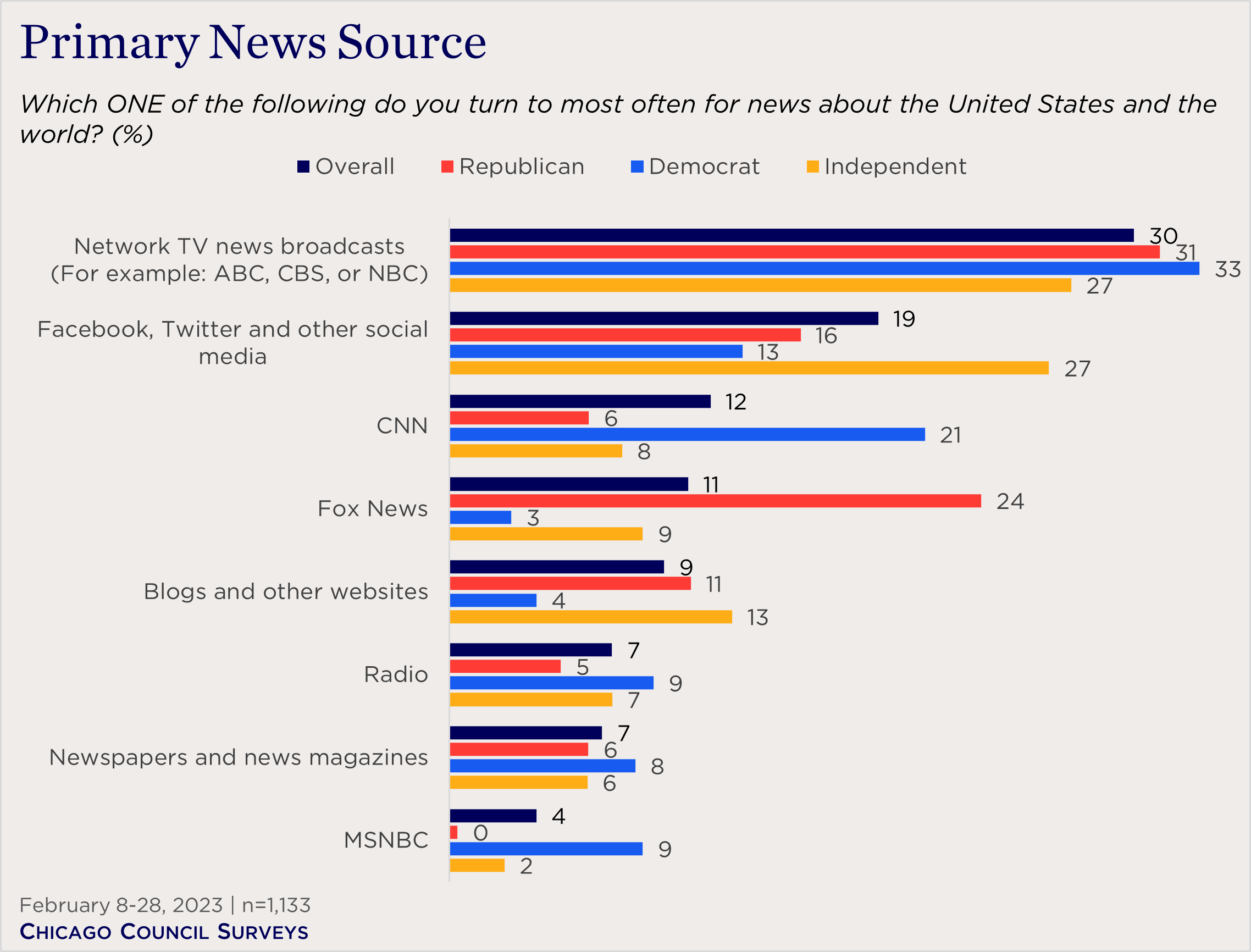
Those Americans who are interested in news about either national or international topics are more likely to get their news from network TV news, while those who are less interested in these topics are more likely to get their news from Facebook, Twitter, and other social media.
Age also plays a role in shaping Americans’ news interest and media habits. Younger Americans are far more likely to turn to social media for news (including 49% of 18-29-year-olds), while older Americans watch TV news (45% of Americans age 60 and above). However, those same younger Americans are also far less likely to report being very interested in news topics, while older Americans report greater levels of interest across topic areas.
Matching their overall patterns of news consumption, most Americans say they turn to television (29%) for news about nuclear policy, while a handful say their top source is newspapers (7%), social media (7%), radio (6%), or academics (3%). A full third (34%) say they do not turn to any source for information about nuclear policy. Social media use is higher among younger Americans, similar to patterns for news consumption in general, with older Americans preferring television.
Television and Government Named Most Often as Sources for More Info
When asked where they would go to learn more about US nuclear weapons policy, top responses include television (24%), government (21%), academics (16%), social media (13%) and newspapers (12%). Those who are interested in learning more are somewhat more likely to say they would seek out government sources to do so (24%, vs. 15% of those not interested).
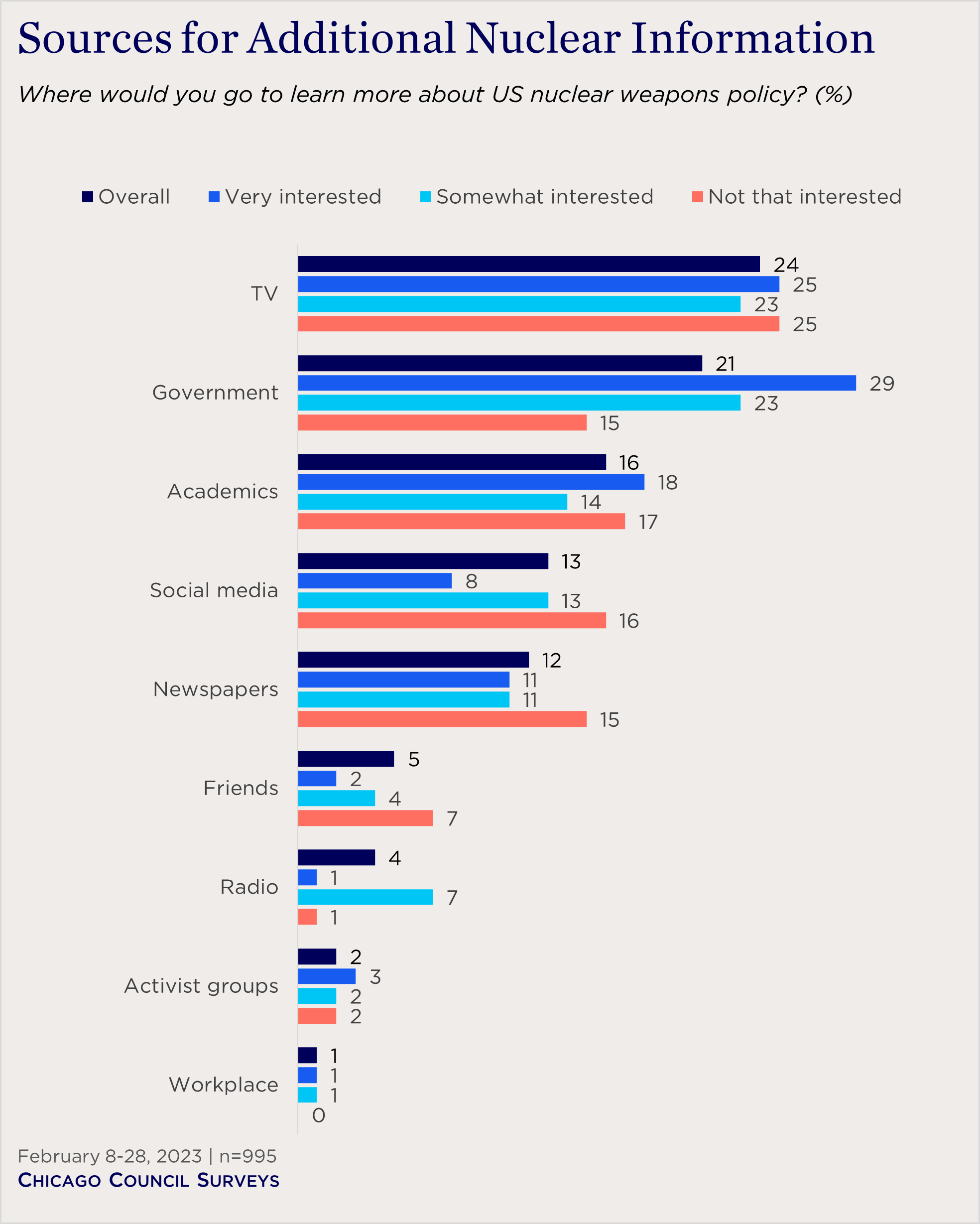
Those interested in learning more about nuclear policy are also more likely to say that they most often turn to TV for information about US nuclear weapons policy (33%, vs. 21% of those not interested). Americans who are not that interested or not at all interested in learning more say that they do not turn to any source for information about US nuclear weapons policy (55%, 21% turn to TV), and are more likely to report that their primary source of news about the United States and the world is social media (24%, though 26% watch also network TV news).
Few Would Like to Get More Involved in Making Impact on Nuclear Policy
About two in 10 Americans say they would like to get more involved in making an impact on US nuclear policy (6% would like to be less involved). Four in 10 say they would like to be as involved as they are now (39%), and a third express no desire to get involved (34%). When those who do not want to get more involved are asked what is keeping them from doing so, respondents provide a mix of reasons: the feeling that they don’t have enough influence to make a difference (25%), a need for more knowledge on the topic (22%), lack of time (17%), other responsibilities (14%), lack of access to decision makers (8%), and not knowing whom to contact to get involved (6%).
Despite expressing a limited interest in getting more involved, some Americans are willing to take actions to promote their position on US nuclear weapons policy. The most popular way to do so appears to be voting: seven in 10 would vote for a candidate who shares their views on nuclear policy (69%). Three in 10 say they would write or speak to a public official about nuclear policy (29%). About two in 10 say they would attend a political event, rally or organized protest to promote their views (21%); give money a political cause or candidate who shares their views on nuclear policy (22%), or donate money to an organization that shares their views (23%). These actions broadly parallel Americans’ reported prior political activist over the past four years, with three in four reporting voting in a local, state, or Presidential election, while around two in 10 say they have attended a political meeting, written to a public official, or donated money to a candidate or cause.
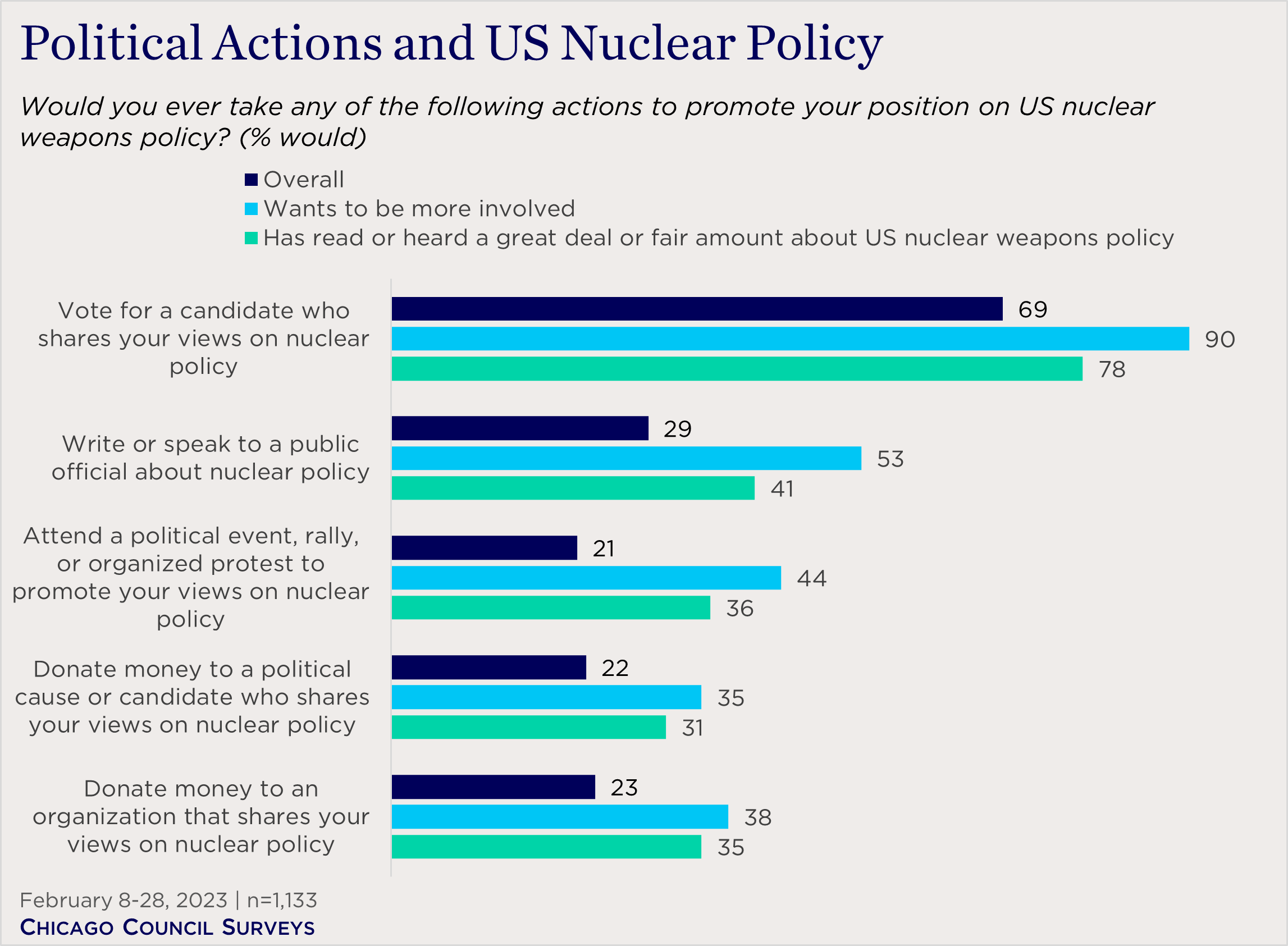
Past political activity is also correlated with an increased willingness to undertake similar actions to promote their positions on US nuclear weapons policy. Among the three in 10 Americans who report having written or spoken to a public official in the past four years, two-thirds (64%) say they would do so to promote their position on nuclear policy. A similar proportion of those who have donated money to a political candidate say they would donate money to a candidate who shares their views on nuclear policy (63%). And half of those who have attended a political event, rally, or protest in the past four years say they would do so in support of their nuclear policy positions (51%, 48% say they would not).
Finally, Americans who are interested in learning more about US nuclear policy are also more likely to want to be more involved in making an impact (33%, vs. 5% of those not interested), though a plurality of Americans interested in nuclear policy say they want to remain as involved as they are now (42%).
Conclusion
The prospect of Russia’s use of nuclear weapons seems more realistic now than it has for decades given the invasion of Ukraine, and a potential new nuclear arms race in Asia looms over international stability. Amidst this context, the United States is undergoing an extensive—and expensive—nuclear modernization process, which may well force nuclear issues back onto the front pages for the American public.
As the Chicago Council-Carnegie Corporation survey shows, a limited percentage of Americans say they are familiar with US nuclear weapons policy, their costs, their effects, and other issues related to the US nuclear weapons arsenal. But there is a significant public appetite for increasing that knowledge around US nuclear policy in general and, specifically, how these weapons work, their effect once deployed, and who they are targeted against.
While Americans lean toward positive assessments of US nuclear policy, a majority admit that they are uncertain about the ultimate benefit or harm US nuclear weapons could bring to them personally. Many Americans—especially younger and non-White Americans—don’t think nuclear weapons make a difference to US national security, or they don’t know enough to say. Moreover, relatively few Americans are interested in flexing their agency or getting more involved in making US nuclear policy beyond voting for a candidate who shares their views on nuclear policy. The haziness about the topic among these particular pockets of the American public (younger and non-Whites) might point to a need for broader education efforts around nuclear topics in order to create a more active and informed citizenry. As this survey shows, the interest to learn more is there.
- 1
Nuclear deterrence is a military doctrine that is based on the idea that an enemy will be deterred from using nuclear weapons as long as it can be destroyed as a consequence.
This analysis is based on data from a survey conducted by NORC at the University of Chicago on behalf of the Chicago Council on Global Affairs using the AmeriSpeak Panel.
The survey was conducted February 8-28, 2023 in both English and Spanish among a weighted national sample of 1,133 adults aged 18 or older living in all 50 US states and the District of Columbia. The margin of sampling error for the full sample is +/- 3.99 percentage points. The margin of error is higher for partisan subgroups or for partial-sample items. The survey was administered in two modes depending on the preference of the respondent provided during the panel recruitment: 1) self-administered by the respondent online via the Web; or 2) administered over the telephone by a live interviewer.
About the AmeriSpeak Panel
Funded and operated by NORC at the University of Chicago, AmeriSpeak is a probability-based panel designed to be representative of the US household population. Randomly selected US households are sampled using area probability and address-based sampling, with a known, non-zero probability of selection from the NORC National Sample Frame. These sampled households are then contacted by US mail, telephone, and field interviewers (face to face). For more information, visit AmeriSpeak.norc.org.






Related Content
 Public Opinion
Public Opinion
A solid majority (69%) say that it would never be justified for Moscow to use a tactical nuclear weapon in its current military operation against Kyiv.
 Defense and Security
Defense and Security
While Americans may support a retaliatory strike if the United States is attacked, Council polls reveal they oppose using nuclear forces to defend allies.
 Public Opinion
Public Opinion
Today, most Americans don’t want a world with nuclear weapons. According to the 2020 Chicago Council Survey two-thirds of Americans (66%) believe that no country should be allowed to have nuclear weapons.


